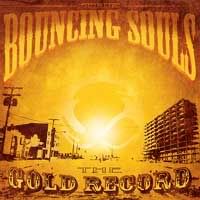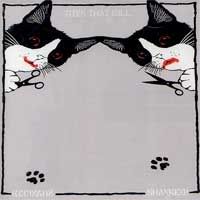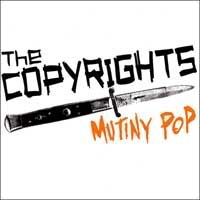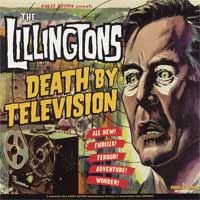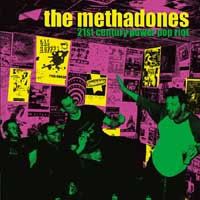Interview: Greg Attonio of The Bouncing Souls
This is a bit of an act of contrition. I've been fairly slack with my updates of late. So in an attempt to appease you the good reader, I present an interview I conducted with Greg from The Bouncing Souls for Time Off magazine a few weeks ago. If you kids are nice, I'll even re-post the interview I'm conducting with Pennywise tomorrow morning. Or not. So without further ado.
 You’d expect a band like the Bouncing Souls - one with a near 20 year history and who’ve just completed their 7th full length record - to utter clichés about keeping things fresh. But as vocalist Greg Attonio explains, the old adage, that familiarity breeds contempt, is merely a well worn truth.
You’d expect a band like the Bouncing Souls - one with a near 20 year history and who’ve just completed their 7th full length record - to utter clichés about keeping things fresh. But as vocalist Greg Attonio explains, the old adage, that familiarity breeds contempt, is merely a well worn truth.
Like all great punk rock, the Bouncing Souls were born out of boredom, alienation and angst. The band first jammed while the members were still in high school, playing out of necessity more than want.
But after eking out a comfortable existence and a fan base that spans the width of the globe, the Bouncing Souls found their angers tempered and their passions waning. Attonio explains the process the Bouncing Souls undertook to keep things novel for ‘The Gold Record’.
“I think you have to hit it from a different angle every time and be fresh about it,” he says from his father’s house in New Jersey. “We got together and wrote all the songs together which we hadn’t done on our previous records.
“We also had Ted Hutt, who’s a producer, involved in the song writing process. It’s like a relationship. One you’ve had for a long time. You tend to do the same things. You have to mix it up. And it’s not always easy to do that on your own. It was good to have his perspective. To look at it objectively.”
Because the Souls congealed while the members were in their formative teenage years, one could imagine the function of their music shifting from the therapeutic one it once took on. Attonio explained the process of reconciling his artistic ambitions with the realities of the road.
“When I was a kid, music was my release, we’d go into a jam room or a basement and it was my release from life. Now we’re musicians and we’re going and getting paid for it. It really was a dream come true.
“You find yourself in a job that’s fucking hard. You play for one hour every night. But what people don’t see if that you’re in a van travelling 10 hours a day. And it’s like torture. You’re almost better off having a normal job.”
While few would doubt the Bouncing Souls’ zeal for life and romanticism, their music has never been marked by political commentary. Instead their catalogue is littered with boisterous drinking anthems and tales of comradery.
But on ‘The Gold Record’ the song ‘Letter From Iraq’ strays from the Bouncing Souls’ usually a-political tone.
“You know love songs are great but sometimes you feel you want to say a little bit more.” Attonio says of the origin of the song. “We had a friend, Garrett, who was just about to leave for Iraq. We met him when we were in Germany. We became friends and (Bouncing Souls’ bass guitarist) Brian decided to make a letters from Iraq spot on out website, where we could put up his letters.
“When we started writing the record we were looking for ways to express ourselves and it didn’t make sense because we didn’t have that true experience. Jarrod e-mailed us the next day. And we thought ‘yes, we can just put this to music’”.
 You’d expect a band like the Bouncing Souls - one with a near 20 year history and who’ve just completed their 7th full length record - to utter clichés about keeping things fresh. But as vocalist Greg Attonio explains, the old adage, that familiarity breeds contempt, is merely a well worn truth.
You’d expect a band like the Bouncing Souls - one with a near 20 year history and who’ve just completed their 7th full length record - to utter clichés about keeping things fresh. But as vocalist Greg Attonio explains, the old adage, that familiarity breeds contempt, is merely a well worn truth. Like all great punk rock, the Bouncing Souls were born out of boredom, alienation and angst. The band first jammed while the members were still in high school, playing out of necessity more than want.
But after eking out a comfortable existence and a fan base that spans the width of the globe, the Bouncing Souls found their angers tempered and their passions waning. Attonio explains the process the Bouncing Souls undertook to keep things novel for ‘The Gold Record’.
“I think you have to hit it from a different angle every time and be fresh about it,” he says from his father’s house in New Jersey. “We got together and wrote all the songs together which we hadn’t done on our previous records.
“We also had Ted Hutt, who’s a producer, involved in the song writing process. It’s like a relationship. One you’ve had for a long time. You tend to do the same things. You have to mix it up. And it’s not always easy to do that on your own. It was good to have his perspective. To look at it objectively.”
Because the Souls congealed while the members were in their formative teenage years, one could imagine the function of their music shifting from the therapeutic one it once took on. Attonio explained the process of reconciling his artistic ambitions with the realities of the road.
“When I was a kid, music was my release, we’d go into a jam room or a basement and it was my release from life. Now we’re musicians and we’re going and getting paid for it. It really was a dream come true.
“You find yourself in a job that’s fucking hard. You play for one hour every night. But what people don’t see if that you’re in a van travelling 10 hours a day. And it’s like torture. You’re almost better off having a normal job.”
While few would doubt the Bouncing Souls’ zeal for life and romanticism, their music has never been marked by political commentary. Instead their catalogue is littered with boisterous drinking anthems and tales of comradery.
But on ‘The Gold Record’ the song ‘Letter From Iraq’ strays from the Bouncing Souls’ usually a-political tone.
“You know love songs are great but sometimes you feel you want to say a little bit more.” Attonio says of the origin of the song. “We had a friend, Garrett, who was just about to leave for Iraq. We met him when we were in Germany. We became friends and (Bouncing Souls’ bass guitarist) Brian decided to make a letters from Iraq spot on out website, where we could put up his letters.
“When we started writing the record we were looking for ways to express ourselves and it didn’t make sense because we didn’t have that true experience. Jarrod e-mailed us the next day. And we thought ‘yes, we can just put this to music’”.
